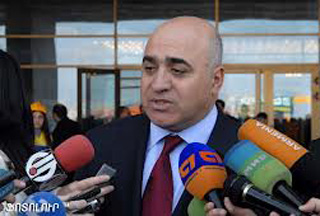
Armenia may become a bridge between the EU and the Customs Union Markets

Our interviewee is the chair of the Businessmen and Producer Union of Armenia Arsen Ghazaryan
-Mr. Ghazaryan, after Armenia becomes a member of the Customs Union to what extent will the economic policy of the country change?
-I don’t quite understand why the public is so hostile to the statement of the president and the launch of this process. We will be able to become a member of the Union only after some work is completed. I don’t understand the discontent because ever since the collapse of the Soviet Union we have been actively cooperating with Russia in the framework of the CIS. Moreover, Armenia has been a member of the Collective Security Pact. So this Customs Union is very similar to the Collective Pact only in the economic sector. As a CIS member, we work in a very similar legal field. There is no customs fee in the CIS territory. During the 22 years of independence we have been integrated with the CIS territory and mostly cooperate with Russia trade-wise. Today 1/3 of Armenia’s export is sent to CIS and the 1/3 to EU and the remaining 1/3 to the rest of the world. And our goods are competitive first of all in the CIS countries. We mostly export our mining resources to Europe and China. Thus, we are economically integrated in the CIS territory. Not only our energy comes from Russia but almost 80% of our economy is linked to Russia. And the whole world is struggling against that – Europe, USA. Then they get surprised why we enter the Customs Union. I was thinking why haven’t we decided to do so sooner. I, as a businessman, have always been interested in entering the Union soon. But now the opponents of this project try to form a conflicting public opinion by claiming that by doing so we are ignoring the EU. In November we were only supposed to pre-sign the association agreement in Vilnius. Armenia will continue working in order to become integrated with the EU, including the economic sector. The negotiation process will show the outcome. I am sure that we will be a unique case. Armenia-Moldova-Ukraine cannot be on the same level. First, our geopolitical situation is the most complicated. The borders are closed. This is very important. Unlike other countries we have conducted a complementary politics. And I think we might become a bride between the European and CIS markets and the two will become even more integrated. I am sure that the official response of the EU regarding this process is going to be different from the ones that we hear by different EU officials.
-What will the Customs Union give to us. We already pay zero customs fee now, don’t we?
-After entering the Union Armenia will significantly benefit economically. Why? As a result of this, the inflow and outflow of material and human resources will become easier. I am not sure if years after this the membership rules would be the same. They might have defined customs fees for CIS states as well. This is a transition phase. Ukraine is a CIS member but it turned out that their chocolate lacks quality. And it was a serious export product for them. Ultimately, economic levers will be used for political benefits. There will always be a fight for markets. Last week during a conference organized by the ministry of economy the Customs Union officials tried to introduce the Armenian businessmen to the technological procedures. New criteria will be elaborated. They have a little stricter approach to some of the product types and this is very good because some day an official might wake up and say that we have too many pesticides in the Armenian grapes and we won’t be able to export those anymore. By this, we are stabilizing the market and provide a stable development. We will be able to attain the Customs Union resources at their net price. That includes raw materials, energy sources, gasoline. We won’t be paying the 30% export fee. As there is no land border, the Armenian and Russian officials will do everything to open the Abkhazian railroad. This will serve as additional lungs for the Armenian economy. I seriously doubt that the European market is waiting for us impatiently because here the agriculture is subsidized and there is internal protection.
-Don’t you fear that European investments will reduce in our country?
-I don’t think they will reduce essentially because we have never expected major investments from them. I don’t see a big issue here.
-Isn’t the absence of a joint border a problem anymore? Will Georgia not create problems?
-With Sahakashvilli’s initiative years ago Georgia left the CIS and slammed the door. From then on the transit of our cargo through Georgia hasn’t been complicated. We successfully cooperate with Georgia and have many economic agreements. We will still maintain our agreements with Georgia and it won’t be a problem.
-What kind of inflation shall we expect?
-They speak a lot in Armenia that Georgians offer us an expensive transit because we don’t have an alternative. No. The Georgian transit has been long ago cleared from bribery and the sector is well regulated. The railroad fee per kilometer is the same both for South Caucasian and Georgian rails.
-Do you have any calculations the prices of which goods will go up? According to certain economists, after the membership to the Customs Union, the import fee of vehicles from Europe will increase 4-5 times.
-We don’t have calculations. But why should there be such inflation? I don’t know what mechanisms will be applied in the future but are the fees cheap now? We pay quite serious taxes. Moreover, we have been paying a luxury tax for the past two years. Time will show whether there will be new fees. It all depends on how professionally we negotiate with our European partners. We are quite professional as a state body and I doubt that the prices will drastically go up. I think the problem is only the public opinion because we have been speaking about the association agreements for the past years. We should have complimented and welcomed Armenia’s agreement to join the Customs Union. But people have opinions that we are going to appear in an abyss and that we are returning to the Soviet Union. No it is not going to happen. We will feel a more powerful economic influence and the circumstance that in the geopolitical and strategic aspect this is the highest security for us is beyond doubt.
-You said that devices and machinery will be imported at a cheaper cost from Russia but higher technologies are in the west and Russia itself needs these technologies.
-We are a highly competitive economy. In Armenia the private sector is working very well. Nobody will make anyone import anything from a country. If the prices are profitable we will import those. If not, we will import those from China, US, EU, Turkey as we do now.
-Today, many experts call Armenia second Kaliningrad. Do you see any points of comparison?
-It is a simple comparison. Armenia is a sovereign state and by accessing the Customs Union no element of sovereignty is reduced. We will have our minister in Moscow. In the committee the decisions are made based on a consensus. How can an independent sovereign state be compared with a Russian enclave? Kaliningrad is a part of Russia. How can they compare with us?
-One of Russia’s officials compared Armenia with an enclave.
-These officials are bearers of soviet stereotypes.
-According to the Eurasian agreement, for the member states the market of mining resources and state purchases market will be opened. What is your opinion about the expected situation of domestic producers?
-In general, the opening of the Russian or any other state’s state purchases market is a great potential for the Armenian economy and we can participate in it if we offer competitive prices. In the past years they really hold transparent electronic contests and let our businesses be involved. Ore mining should be divided in a few parts. If we are talking about copper, molybdenum here the Armenian mines will not have any trouble. We see that the investments are increasing in the Armenian mining sector. We also have mining companies, which use only 10% of their potential. I will be glad if we succeed in increasing out export rates. And if we are talking about new mines then I don’t mind the opening of new mines. Back in the day, we wouldn’t even mind Turkish investment.
-Will the export of mining resources to Europe not become deteriorated?
-Not at all because even now they are exempt from quotas. If we succeed in doubling mining rates we will export our products in larger amounts to Europe. The demand in the international market is pretty high.
-Why do you think Armenia chose to become a full member of the Customs Union and not a partial one?
-In general, I think that partial things always remain incomplete and partial. If you are accessing something you should abide with the rules. Armenia has always been an honorable partner in any structure it has been a member of. The same can be said about its relations with the EU.
Iterviewed by Gayane Khachatryan























